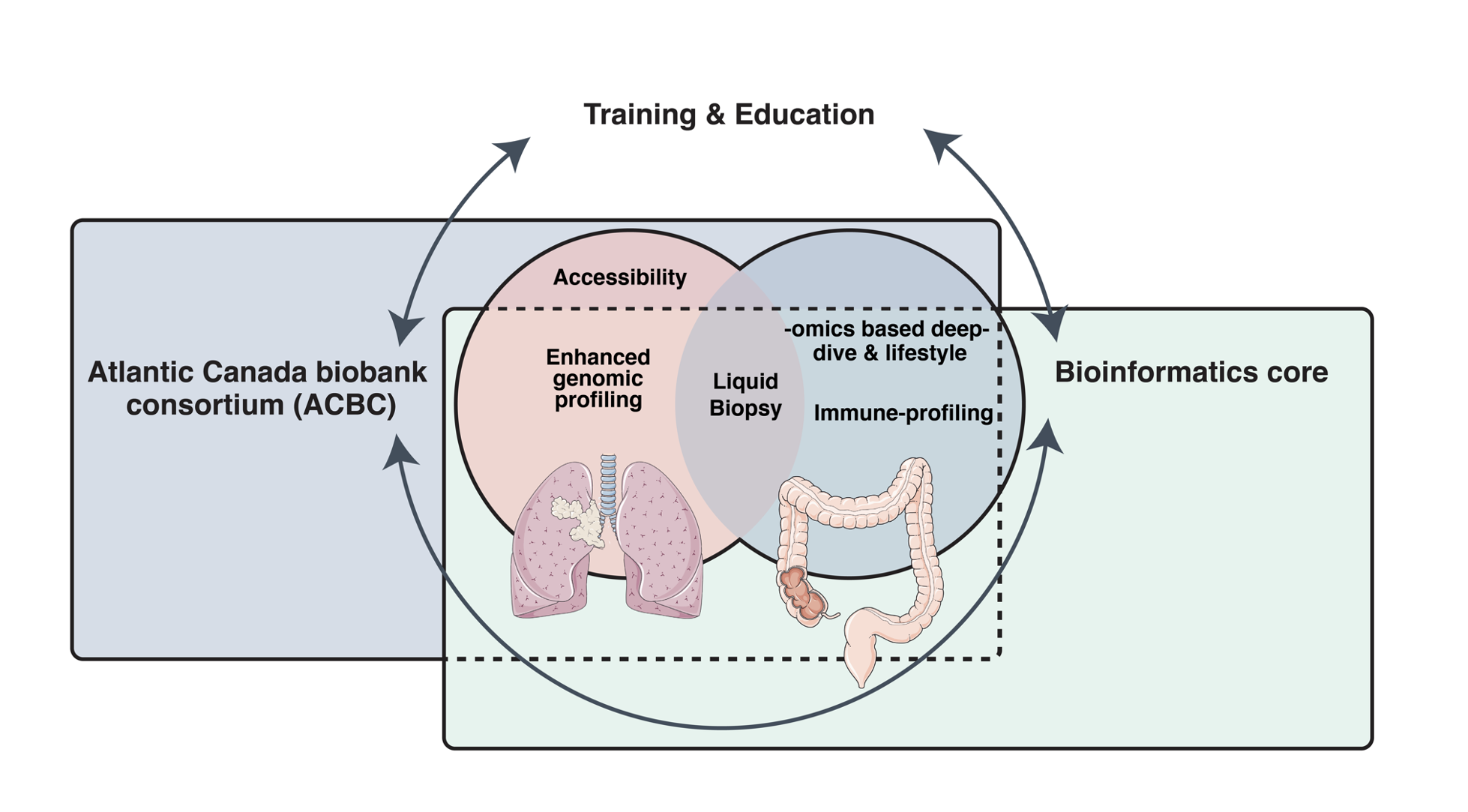Understanding our five demonstration projects
The ACC has developed five projects to establish a foundation for precision medicine in the region - three infrastructure and two research projects. These projects have been peer reviewed internationally and approved by the TFRI. The first two projects are infrastructure projects designed to build the foundation for precision medicine research across the Atlantic region. The third project is focused on building capacity and expertise throughout the region, a critical issue in order to bring precision medicine to the clinic in this region. The last two projects are demonstration projects that critically rely on the infrastructure and capacity built by the first three projects. The demonstration projects were designed to target the two deadliest cancer types in the region: lung cancer and colorectal cancer (CRC), for which the Atlantic region has the highest rates in all of Canada.

Illustration of how the infrastructure and capacity building projects (ACBC, bioinformatics core, and training) support the objectives of the demonstration research projects in colorectal cancer and lung cancer (Illustration credit – “Designs That Cell”)
PROJECTS
Project 1: Atlantic Canada Biobank Consortium (ACBC), the inter-provincial integration of biological material and clinical data from patients treated within the Atlantic Canada Consortium (ACC). The Atlantic Biobank will collect and store patient specimens and data using internationally recognized standards. Over the course of the 2-year pilot, the biobank will acquire at least 450 specimens from colorectal cancer (CRC) patients and 250 specimens from lung cancer patients. In addition to facilitate research collaborations and clinical trials through the colorectal and lung cancer collections, the long-term goal will be to expand the biobank collection to additional types of human biological material (e.g. multiple myeloma, pancreatic cancer, breast cancer, glioma, and prostate cancer) and add retrospective data and samples from existing collections when possible. Learn more about the Atlantic Canada Biobank Consortium (ACBC), here.
Project 2: Bioinformatics Core. ACC will advance bioinformatics capability to ensure all of our patients have access to the most advanced technologies in the most efficient manner possible. The long-term goal will be to build a critical mass of clinical bioinformatics personnel in cancer care and research (for training purposes, knowledge sharing, and recruitment) and a robust genomics data sharing and analytics platform in Atlantic Canada. As well, we will integrate our analyses with the rest of Canada so that data collected in other regions can improve care in Atlantic Canada, and vice versa.
Project 3: Training and Education in Precision Medicine. Building on the strengths of the Atlantic-wide Cancer Research Training Program, offered by the Beatrice Hunter Cancer Research Institute (BHCRI), ACC will offer educational and hands-on training opportunities in biobanking (collection and storage of biomaterials), bioinformatics (acquisition and analysis of associated data), and fundamental science to discover research trainees well as clinical residents specializing in all aspects of cancer care. This will build a critical mass of local expertise to ensure that Atlantic Canada continues to offer the most advance care. The goal is to establish a core curriculum for training in precision medicine that can be expanded and shared countrywide.
Project 4: Molecular, Genetic and Immune Profiling of Colorectal Cancer in Atlantic Canada. Building on prior work with families from our region who have inherited an increased risk of developing CRC, the ACC will use novel analytical approaches to look for new predictive markers (genetic mutations and risk factors), and examine the role of the immune system and gut microbiome in a prospective cohort of patients with colorectal cancer. In addition, we will integrate the use of blood samples as a liquid biopsy for CRC diagnosis and monitoring as a method to improve access to care for rural regions.
Project 5: Clinical implementation of enhanced next-generation sequencing (NGS) based lung cancer molecular profiling in Atlantic Canada: reaching a rural and underserved Population. Leveraging our existing molecular oncology infrastructure for lung cancer, the ACC will focus on delivering precision medicine to lung cancer patients in rural and underserved areas. This will involve enhancing our current lung cancer biomarker profiling above existing levels, and supporting liquid biopsy research to reduce the need for tumour biopsies and diagnostic imaging and to more rapidly assess therapeutic response. Lastly, we will quantify and evaluate the barriers in the region that result in inadequate access to high-quality molecular diagnostics.